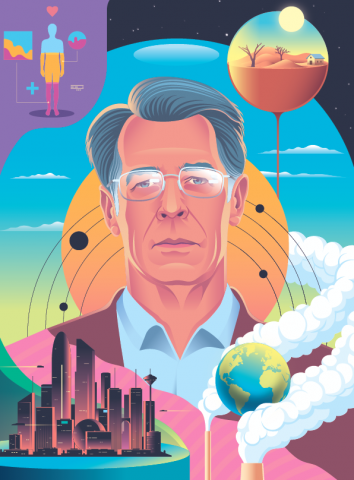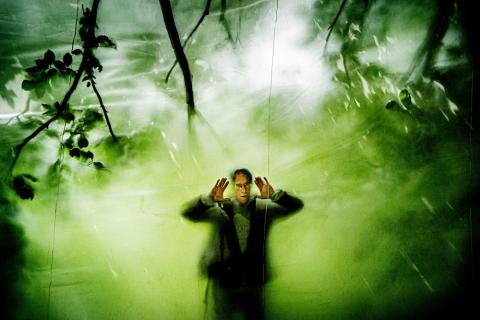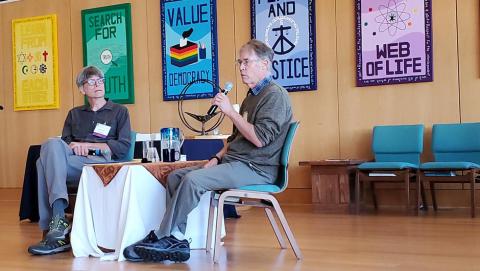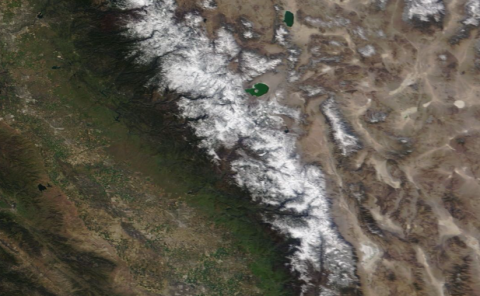Musing about optopias
Submitted by Kimon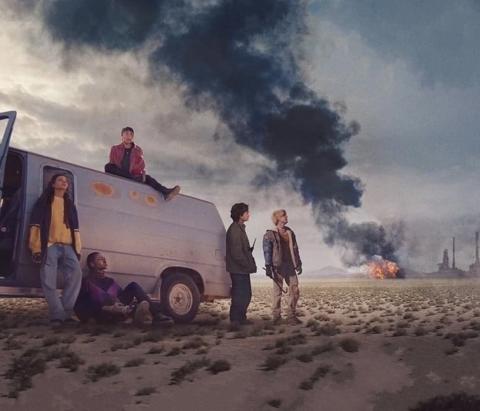
First of all, some sad news. Terry Bisson, fellow Bay Area science fiction author and friend of KSR, passed away recently. Coincidentally, KSR had recently chimed in about Bisson in a New Yorker profile. He also wrote an appreciation for Bisson in February's issue of Locus.
The High Sierra
We first start with things around the non-fiction The High Sierra: A Love Story, because we don't talk enough about it!
KSR was interviewed about it by the US Times Post: Sci-fi novelist Kim Stanley Robinson talks ‘The High Sierra’
There are many places on this planet that are incredibly beautiful and adorable. You don’t have to burn a lot of carbon to have a good time. The basics of Paleolithic contentment remain the same within us and are readily available. The technological sublime is indeed sublime, but like a drug rush – it’s expensive and can be tiring. The ordinary pleasures are better all around. Walking is one of those pleasures – we evolved to walk better! And hiking in the mountains is fun, but so is hiking in the city or pretty much anywhere else.
He spoke to The Tahoe Weekly: A science fiction writer’s love affair with the High Sierra
He discussed at the UC Davis Tahoe Environmental Research Center (YouTube video)
He spoke to the Pacific Zen Institute's podcast on The High Sierra: The Zen Luminaries
The High Sierra also won some awards! Here they are, with short online KSR interventions:
- Commonwealth Club: 92nd Annual California Book Awards (award ceremony video on YouTube)
- California Independent Booksellers Alliance: Golden Poppy Awards: Glenn Goldman Award: California Lifestyle (award ceremony video on YouTube)
Some book excerpts are available:
On John Muir, along with various other KSR quotes on John Muir:
The flooding of Hetch Hetchy was a knife thrust into the heart of the wilderness movement. [...] But the war is never over. And as I looked down on the scene that misty evening, I saw the water drain away. It will happen someday. There is no rush about this, and given the emergency century we are entering, it isn’t even close to the highest priority. But put it this way: if civilization gets itself in a balance with the planet, a day will come when we will drain that misbegotten death lake and let the valley go back to the way it was. It will be one of the greatest experiments in landscape restoration ever conducted.
A 1988 poem by KSR is included in the book: Night Poem:
Writing by starlight
Can’t see the words
Fill a page
Nothing thereWaterfall distant sound
Tree against stars Milky Way
Juniper Jupiter white rock
Wind dying my heart
At peace a Friday nightBig Dipper sits on the mountain
Friends lie in their tents
I sit against rock
Star bowl spinning overhead
Feel the movement
And soar awayWho knows how many stars there are
All those dim ones filling the black
Until it seems no black is there
And then you see the Milky WayThe sky should be pure white with stars
That’s black dust up there
Blocking the view
Carbon and hydrogen
All of us flung togetherIn just this way
A blank white page
I write and then
A blank white page
Story of my life!
Some recommendations for The High Sierra at The Atlantic, Visit California, and University of California.
The interviews
Now, on to the usual long list of interviews with Kim Stanley Robinson which are mostly about The Ministry for the Future -- catching up with several that I missed the last time, too, approximately chronologically:
KSR was interviewed for the inaugural issue of Solarpunk Magazine!
Interview at The Great Simplification podcast: Climate, Fiction, and The Future
Interview at the Rising Tide podcast: KSR's Science and Fiction
(Print) interview by Liz Jensen at Writers Rebel (of Extinction Rebellion): Q&A with KSR
We now need public action (government) to be driving all private actions that are relevant to the crucial project; what work gets paid for and done, what consumption patterns are allowed, etc. This is not ‘green fascism’ any more than the Allied response to Nazi aggression was ‘democratic fascism’; it’s more a case of democratically approved coordinated public action in strong support of the public good. Legal action is needed for that. But it’s also an “all hands on deck” situation now, so no one solution will suffice. We need action across all fronts of society.
(Video) interview with Grist's Looking Forward, following their book club on Ministry for the Future: "At least zombies aren’t eating my face" (video on Vimeo)
At a certain point, dystopia has run its course of what it can do usefully. So then you need the positive stories. I’ve been writing utopias since about 1987, so that’s adding up to a lot of years of just trying to do the positive because I think we need it more. And it’s harder, technically — it’s less dramatic. But it’s interesting because you get new stories that haven’t been told before.
KSR appearance at the 2023 Learning Planet Festival (YouTube video replay)
Interview by Madrid's La Casa Encendida: Nuevas ecotopías para estos tiempos (YouTube video, dubbed-over in Spanish)
KSR lecture at the University of San Diego's Kroc School Institute for Peace and Justice: KSR Talks Climate Change (YouTube video) (also in the podcast Is The World On Fire?)
UC Davis Environmental Humanities: "Ministries for Future" - Donna Haraway and Kim Stanley Robinson (video) (+ Davis Vanguard article on the event)
New Hope Network has some highlights from KSR's appearance at the 2023 Natural Products Expo West for Climate Day: Science fiction offers roadmap for our planet's future
BC Heights has some highlights from KSR's appearance at the Boston College Lowell Humanities Series: Robinson Outlines Ways To Fight the Runaway Greenhouse Effect
KSR talked again at the Bioneers conference and gives an update: What I’ve Learned since The Ministry for the Future Came Out in 2020 (YouTube video)
KSR was at two events hosted by the College of the Atlantic in Bar Harbor, Maine, here are the recordings on YouTube: Coffee & Conversation: Sci-fi and Our Climate Reality and Summer Institute: Space: Our Last Great Commons
KSR was interviewed by Bloomberg along with a TV writer and a podcaster on: How to Write a Climate Thriller Fit for Page or Screen
“Dystopia is too easy,” Robinson says. “It's even a kind of comfort food, where we imagine situations worse than ours, and then rest comfortably that we're not that bad.”
To avoid writing futures so optimistic they beggar belief, Robinson borrows a concept from the sci-fi author Joanna Russ: the “optopia.”
“It's not the utopia — the no place, the perfect place,” Robinson says. “It's the optimum that we can do given the situation that we're handed. If we dodge a climate catastrophe and a mass extinction event in this century, that's a utopian story.”
KSR was interviewed by the Centre for Science Futures' new podcast series in partnership with Nature: "Science as a political and ethical project" (see also Nature for a shorter version, with transcript).
While in the Netherlands, KSR spoke at the John Adams Institute: Kim Stanley Robinson and the Fight for Planet Earth (YouTube video), along with environmental scientist Heleen de Coninck and author Lisa Doeland.
KSR appeared on a short video by PBS Terra on Geoengineering
Hot Globe interviewed KSR: The Future of the Future (partly paywalled)
It isn’t going to be machinery that solves our problems. But on the other hand, it is going to be technology because language is a technology. Justice is a technology, law is a technology. They're software. And so any argument against technology misunderstands human beings. We were technological before we were human. We had fire. We had stone tools. We co-evolved with our technologies. And language is the crucial one. And I would agree with those people who say the crucial technologies right now are political economy and finance.
KSR was interviewed by the Possible podcast, on Ministry but also Aurora, Galileo's Dream and more: KSR on the Future of Civilization (on Spotify) + a transcript on their site
One of the things that has gotten stronger for me as the last 40 years have passed is a conviction that humanity coevolved with Earth. It will never prosper off of Earth. Our trips off of Earth are trips into the death zone, which is what climbers call the elevations above about 26,000 feet, where the body starts to break down [...] this information that now is common—50% of the DNA inside your body is not human DNA. Well, this is news, and it changes everything. Because you can’t take Earth with you when you go off, even to the moon or Mars, much less off into interstellar space, where I have actually written an entire novel suggesting we’re not going to the stars because we coevolved with Earth, and we’re only healthy here. And in my solar-system novels—where you can see some from the mid-eighties and some from the last 10 years—you’ll see a shift in that in the ones in the last 10 years, people always have to go back to Earth for their sabbatical. They have to go back and eat some dirt. They have to get connected with the biosphere of Earth, which is their extended body, in order to be healthy again.
KSR talked to the Carnegie Council for Ethics in International Affairs: Why does the world now need to consider solar radiation modification? (YouTube video)
The Economist interviewed KSR and Laurence Tubiana on the the need for fiction about climate change on their podcast Babbage: Climate fiction meets climate fact (on Spotify)
The Science in The Fiction podcast does one writer and one scientst episode: KSR talked about Ministry (on Spotify) and glaciologist Heidi Sevestre talked geoengineering
Sam Matey's The Weekly Anthropocene interviewed KSR: Kim Stanley Robinson, Science Fiction Maestro and Utopian
When I look at the timeline of Ministry for the Future I'm very pleased to report that there are some sentences in it that no longer conform at all to reality as it's going. One chapter begins, “the 2030s were zombie years.” And that is now wrong! [...] it's going so much faster that I think the timeline in Ministry for the Future is completely off. We're already in the ferment that in my novel I have happening in the 2040s.
The Everyday Anarchism podcast continued its coverage of KSR's works with the Mars trilogy and an interview with KSR: Revolution and Anarchism in The Mars Trilogy
The Futurists podcast talks with KSR on his Mars trilogy, economics, world building, science and climate: Minister for the Future (Part 1 and Part 2)
Berkeley Talks podcast...talks with KSR: Sci-fi writer Kim Stanley Robinson on the need for 'angry optimism' (including a transcript)
Having put a climate disaster that kills millions in India, I felt obliged to India. I needed to stay there. I needed it to be the solution and not just an excuse for an American to put the problems on the other side of the world and then we solve them. I needed Indians involved in solving it. They are in huge danger from a wet bulb event, although one of the hottest wet bulb events ever recorded was outside of Chicago.
So it isn't like we're not in danger, but India's in real danger. I mean more present, more immediate. And I wanted to stick with them. And the book has been well-received in India. I mean, aside from the occasional hate mail from BJP party nationalists, but by and large, the Indians have said to this book, "Oh yes, Farhanji is finally understood. We are the center of the story and we're going to solve the problem here."
Radio Ecoshock / podcast interviewed KSR about Ministry and The High Sierra: Climate Sci-Fi Gets Too Real
KSR gave a lecture at Stony Brook University for its special series on climate change, and the whole thing is on YouTube.
And finally (for now!), Palma podcast interviewed KSR: What We Imagine, We Make Possible (on Spotify)
The rest
We continue with some additional material:
The book clubs discussing Ministry for the Future continue with Trinity College Dublin and South Burlington Public Library (Vermont).
Recommendations continue with The Conversation (Five fiction books to inspire climate action), The New York Times (This Is the Way the World Ends; paywall), The National (Earth Day: 12 novels to read with an environmental protection theme), The Seattle Times (Dig into these 4 books for Earth Day), and The Washington Post (10 books that will transform how you see nature, paywall), where Nnedi Okorafor writes:
I read “The Ministry for the Future,” by Kim Stanley Robinson, as I was in the process of moving to Phoenix. The novel starts with a deadly heat wave in India. Issues of water shortages and extreme heat were very much on my mind. I knew of Phoenix’s brutal summers, but was yet to experience one. The stark step-by-step details of this catastrophic event that leaves millions dead was such a terrifying read that it nearly gave me a panic attack. I had nightmares. After reading the first part, I went on to take some very aggressive (and expensive) precautions. “The Ministry for the Future” opened my eyes wider to how the Earth is changing and alarmed me in a way that only great science fiction can.
Reviews and articles inspired by Ministry:
- Henry Farrell on Ministry's political economy (in response to the NYT article above)
- Adventures with Psychologists: Tim Hall of Yale '62 discusses Ministry
- Ben Shread-Hewitt (on Resilience.org) reviews Ministry and Stephen Markley's The Deluge
- Once more the heat waves are upon us, and this opinion on Aljazeera mentions Ministry
What's next? KSR's next non-fiction book on Antarctica, in the same style as The High Sierra, is due out soon-ish -- he is turning it in to his publisher in July.
It's structured like my book The High Sierra: A Love Story— the same format, in that it will have a variety of modes, including lyric realism as you called it, memoir, history, geology, and this case, glaciology. I'm enjoying this kind of modular miscellany, or just the kitchen sink principle— just throw in everything. It helps me to do non-fiction.
And KSR will soon be heading to northern Italy, as he will be one of the residents of the Rockefeller Foundation Bellagio Center!
(Top image: from the poster of the fiction film How To Blow Up A Pipeline, inspired by Andreas Malm's non-fiction book)

